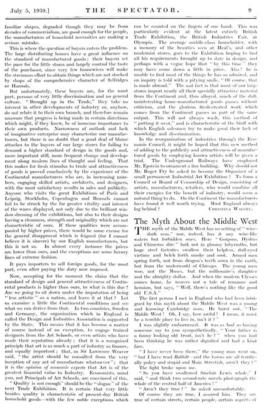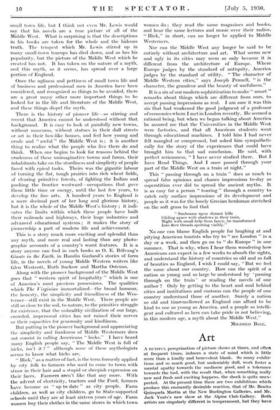The Myth About the Middle West
THE myth of the Middle West has no setting of " wine- dark dark seas," nor, indeed, has it any wine-like waters but forbidden ones. Here " Gorgons, Hydras and Chimeras dire " lurk not in gloomy labyrinths, but huge steel factories swallow their helpless, dull-eyed victims and belch forth smoke and soot. Armed men spring forth, not from dragon's teeth sown in the earth, but from the underworld of Chicago. The young men woo, not the Muses, but the millionaire's daughter and the almighty dollar. And when the moderns Ulysses comes home, he weaves not a tale of romance and heroism, but says, " Well, there's nothing like the good old U.S.A."
The first person I met in England who had been intri- gued by this myth about the Middle West was a young and knowing Cambridge man. lie burst out, " The Middle West ! Oh, I say, how awful ! I mean, it must be a terrible place to live in, isn't it ? "
I was slightly embarrassed. It was as bad as having Someone say to you sympathetically, " Your father is a funny looking old trout, isn't he ? " when you had been thinking he was rather dignified and had a kind face.
" I have never been there," the young man went. on, " but I have read Babbitt—and the towns arc all terrific- ally pokey and stupid and Main Streetish, aren't they?"
The light broke upon me.
" So you have swallowed Sinclair Lewis whole," I said, " and think two second-rate novels photograph the whole of the central half of America! "
" Aren't they true ? " he asked uncomfortably.
Of course they arc true, I assured him. They are true of certain streets, certain people, certain aspects of small town life, but I think not even Mr. Lewis would say that his novels are a true picture of all of the Middle West. What is surprising is that the descriptions in his books are taken for the whole and the hideous truth. The tempest which Mr. Lewis stirred up in many small-town teacups has died down, and so has his popularity, but the picture of the Middle West which he created has not. It has taken on the nature of a myth, and this myth, so it seems, has spread over a large portion of England.
Once the ugliness and pettiness of small town life and of business and professional men in America have been considered, and recognized as things to be avoided, there are a great mr.oy other more important things to be looked for in the life and literature of the Middle West, and these things dispel the myth.
There is the history of pioneer life—so stirring and recent that America cannot be understood without that background. It is easy to look at painfully new towns, without museums, without statues in their dull streets or art in their box-like houses, and feel how young and crude and " awful " the Middle West is ; it is another thing to realize what the people who live there do and think. When one begins to look for reasons behind the crudeness of these unimaginative towns and farms, their inhabitants take on the sturdiness and simplicity of people faced with epical tasks. Theirs was the gigantic labour of turning the flat, tough prairies into rich wheat fields, of clearing primitive forests, of fighting the Indian and pushing the frontier westward—occupations that gave them little time or energy, until the last few years, to develop the fine arts. A hundred years to England is a mere decimal part of her long and glorious history, but it is the whole of the Middle West's history ; it indi- cates the limits within which these people have built their railroads and highways, their huge industries and advanced educational systems ; it makes the story of pionecrship a part of modern life and achievement.
This is a story much more exciting and splendid than any myth, and more real and lasting than any photo- graphic accounts of a country's worst features. It is a story anyone can find in such books as 0. E. Rolvaag's Giants in the Earth, in Hamlin Garland's stories of farm life, in the novels of young Middle Western writers like Glen Westcott, Ruth Suckow and Martha Ostenso.
Along with the pioneer background of' the Middle West goes that " western spirit of hospitality " which is one of America's most precious possessions. The qualities which The Virginian immortalized—the broad humour, the honesty, the simplicity and friendliness of the Wes- terner—still exist in the Middle West. There people are still so close to the soil, to nature, to the primitive struggle for existence, that the unhealthy civilization of our large, crowded, impersonal cities has not ruined their. nerves or their capacities for generosity and kindliness.
But putting in the pioneer background and appreciating the simplicity and frankness of Middle Westerners does not consist in calling Americans " hicks." I have heard many English people say, " The Middle West is full of hicks, isn't it ? " although none of these mythologists seems to know what hicks are.
" Hick," as a matter of fact, is the term formerly applied by city folk to farmers who used to come to town with straw in their hair and a stupid or sheepish expression on their faces. Farmers aren't like that any more. With the advent of electricity, tractors and the Ford, farmers have become as " up to date " as city people. Farm children, as well as city children, go to State-supported schools until they are at least sixteen years of age. Farm women buy their clothes in the same stores in which town women do ; they read the same magazines and books and hear the same lectures and music over their radios. " Hick," in short, can no longer be applied to Middle Westerners.
Nor can the Middle West any longer be said to be entirely without architecture and art. What seems new and ugly in its cities may seem so only because it is different from the architecture of Europe. Where Europe judges by the standard of antiquity, America judges by the standard of utility. " The character of Middle Western cities," says Joseph Pennell, " is the character, the grandeur and the beauty of usefulness."
It is a sin of our modem sophistication to make " smart " remarks about things which are different from ours, to accept passing impressions as real. I am sure it was this sin that had weakened the good judgment of a professor of economics whom I met in London recently. He seemed a rational being, but when we began talking about America he assured me that the Universities in the Middle West were factories, and that all American students went through educational machines. I told him I had never' felt mangled or compressed, but asked him sympatheti- cally for the story of the experiences that could have brought him to that sad conclusion. He said, with perfect seriousness, " I have never studied there. But I have Read Things. And I once passed through your part of the Middle West on a train at night."
This " passing through on a train " does as much to spread false opinions and chance impressions to-day as superstition ever did to spread the ancient myths. It is as easy for a person " touring " through a country to catch only surface impressions of its development and people as it was for the lonely Grecian herdsman stretched on the soft grass to find that
" Sunbeams upon distant hills Gliding apace with shadows in their train, Might with small help from fancy, be transformed Into fleet Oroads sporting visibly."
No one can blame English people for laughing at and pitying American tourists who try to " see London " in a day or a week, and then go on to " do Europe " in one summer. That is why, when I hear them wondering how Americans can expect in a few weeks to absorb the sights, and understand the history of countries so old and so full- of beauties as England, I wish I could say, "But we feel the same about our country. How can the spirit of a nation so young and so large be understood by ' passing through on the train' or reading the novels of one author ? Only by getting to the heart and soul behind. cities and institutions and customs can the people of one country understand those of another. Surely a nation. so old and timramcllowed as England can afford to be kind to one so young as America, and a people so intelli- gent and cultured as hers can take pride in not believing, in this modern age, a myth about the Middle West."
MILDRED BOIE.











































 Previous page
Previous page